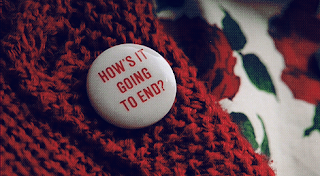Hey, it's not the end of the world
"You should blog again! I've really missed your incisive and profound musings!" said absolutely no one to me the other day. But I'm back anyway. Last time I hadn't written it was due to my tragic indecisiveness, which I wrote a whole post about; this time the problem was time itself- I didn't have enough of it. I suppose I could write a post about time management and the passing of the seasons etc., and then to be really clever I could call that post 'About Time'. Oh yes.
You what? Oh curse you Richard Curtis.* Anyway, I've decided to write a post about THE END OF THE WORLD. I'm getting 2014 off to a cheery start.
Do you remember 2 years ago, 2012? I do. There was that whole idea that the end was nigh and the world might indeed end in that fatal year. And they made that movie 2012, just in case anyone was starting to panic. As you probably noticed, the world didn't end, but the 'world is about to end' movies sadly didn't follow suit. In the summer just gone, we saw a ridiculous number of movies about the end. 'The World's End' did in many ways what it says on the tin. As did 'This is the End'. Brad Pitt's 'World War Z' was about the imminent decimation of humanity, by zombies apparently. 'Pacific Rim' was about giant robots fighting giant monsters as mankind's last hope against total annihilation, and featured the line 'We are cancelling the Apocalypse!' It wasn't a very good movie. Anyway, lots of world ending stuff, and that was just the summer.
Movies about the end of the world aren't a new thing, but now more than ever, storytellers don't seem to be able to stop talking about it.Why is that? It reminds me of the question Jim Carrey's 'Truman' asks himself in the brilliant 'The Truman Show': "Hows it going to end?"
Do we care how its all going to end? I think these movies suggest that we do. Maybe they're just made because the end of the world provides plenty of opportunity for CGI destruction and people running away from explosions. Hollywood does enjoy making things blow up. But maybe there's something else, some kind of unavoidable concern about how this how story of people and planet Earth is gonna be tied up.
And why shouldn't there be? How many good stories have you read where you didn't actually care about the end? Does the couple get together? Does the world get saved? Is that character redeemed? Does the villain get what he deserves? I want this story to end well. Yet, so often in these end times stories the end seems to be about destruction. It seems a bit sad. It seems like everything we loved gets burned up, whether its the sun that takes us out, or the judgement of an angry God who has had enough of the world. Why can't it end with us all holding hands under a rainbow singing 'Don't Stop Believin'?
Hold that thought.
Last summer, I went to visit the Irish National Gallery in Dublin. It was awesome, go check it out if you can. And I stumbled across one particular piece which really struck me.
Its called The opening of the Sixth Seal by Francis Danby. It was an epic (something like 9ft wide by 6ft tall) and this little picture above doesn't really do it justice. Its a dark and brooding picture, yet never dull: the earth is cracking open, as are the heavenly clouds above, and a sharp bolt of lightning thunders down to earth. In the foreground, people are watching this destruction, and two figures stood out to me. One man is facedown on his knees. Another is a slave, shackled but with his arms in the air, as if now he is breaking free from those chains. Hmmm.
So anyway, I really liked the picture. In fact I liked it so much, I bought it.
Well, I bought a postcard of it. No, the postcard is not quite as impressive, but what can you do. The picture is actually a depiction of a scene from the book of Revelation, in the Bible. You know the book of Revelation? The last book of the Bible, lots of stuff blows up and there's fire and judgement and seemingly world ending stuff. Its regularly quoted in the aforementioned disaster movies and on apocalyptic street placards. If it were a 'Friends' episode, Revelation would be the one where everything ends.
Or maybe not. Excuse my while I put my pretentious Greek scholar hat on, but the Greek word used from which we get 'Revelation' is apokalupsis, from which we get our English word apocalypse. Now 'apocalypse' gets used pretty synonymously with 'end of the world', 'armageddon' etc., but apokalupsis doesn't mean 'end of the world'. Its actually about the revealing of truth, making known that which is unknown, its about revealing something new. Hence of course, we call it Revelation. Which sounds more interesting doesn't it? But what exactly is being revealed?
I'll keep it short, but effectively, the Christian story is about is about Heaven coming to Earth. About this world being redeemed. We're not just trying to escape Earth to go play harps in heaven. Rather, we are told God is making everything new. New Heavens, New Earth. The end of Revelation talks not about sitting on a cloud but about people living in a beautiful City.
And the fire and the judgement? Yeah that's there too, but it might not be what you think. If you read about destruction in Revelation try not to see that as just an angry God who feels like crushing some ants. Its not that. Its about God saying that rape and murder and war and cruelty and injustice and hatred and pain and hurt and suffering have no place in the new world he's making. So he's getting rid of them, he's judging those things. He's punishing evil, and destroying it forever, which actually, is a pretty good thing, right? I think this says it better:
"See, the home of God is among mortals. He will dwell with them; they will be his peoples, and God himself will be with them; he will wipe every tear from their eyes. Death will be no more; mourning and crying and pain will be no more, for the first things have passed away." (Revelation 21:3-4)So, God's making his home with us, forever. And suffering will be no more, forever. As Sam Gamgee once said to Gandalf, "Is everything sad going to become untrue?" Apparently so, Sam.
Remember the two men in the painting? One on his knees in worship, the other a slave breaking free from his chains. Why is the slave rejoicing when the world is ending? Because the chains of human oppression are coming off; now Jesus has come to make things right. There is no more slavery. He is actually free! And the other man is on his knees, presumably just saying 'wow'. Because God is here. Because everything is about to change.
So back to that question, hows it all going to end? What do you think? I'd love to hear your thoughts on this. Apparently, it ends with something beautiful, incredible, inexplicable, something we never expected. When it does, some might be on their knees in worship. Others might be singing because they're free.
I think that's kind of exciting. The movies we see may just focus on the oncoming destruction, but what if we think bigger than that?
What if its not the end of the world? What if its the beginning of a whole new one?
Bring on 2014.
---------------------
*I don't actually wish any curses on Richard Curtis. Love Actually is undeniably brilliant.




Comments
Post a Comment